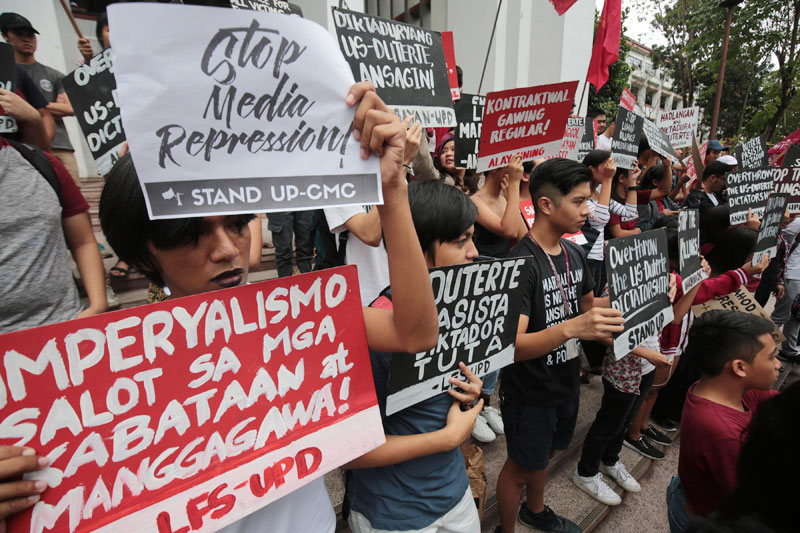Philippines EU GSP+ status hangs in the balance
January 22, 2018 at 18:00
Philippines EU GSP+ status hangs in the balance

The second biennial GSP report released by the European Commission and the European External Action Service highlighted the country’s progress in areas such as gender equality, trafficking in persons, labor rights, health, education, socio-economic rights, fight against corruption, and protection of the environment. File
MANILA, Philippines — The status of the country’s Generalized Scheme of Preferences Plus (GSP+) with the European Union (EU) continues to hang in the balance as the trade bloc hit anew human rights conditions in the Philippines, but lauded the government’s fight against corruption and efforts in promoting labor rights.
The second biennial GSP report released by the European Commission and the European External Action Service highlighted the country’s progress in areas such as gender equality, trafficking in persons, labor rights, health, education, socio-economic rights, fight against corruption, and protection of the environment.
However, the EU expressed grave concern over cases of extrajudicial killings, in particular in the fight against illegal drugs, and related impunity for those responsible.
The EU also raised serious concern over the possible reintroduction of the death penalty and the lowering of the age of criminal responsibility in the country.
“The way the campaign against illegal drugs is conducted is a matter of grave concern, in particular the large number of drug-related killings as well as the sharp increase in prison overcrowding.The significant increase in the number of drug-related killings since the election of President Duterte, in particular during law-enforcement operations; the apparent lack of due process and restraint during these operations; and the fact that these deaths are not investigated in a transparent, impartial and effective manner thus allowing to bring perpetrators to justice raises serious concerns regarding the right to life,” the report said.
“Together with statements by the President that can be seen as incitement to killings and fostering a culture of impunity, the conduct of the war on drugs raises serious questions about the government’s commitment to human rights,” it added.
The report also pointed out how the potential re-introduction of the death penalty would be a major step backwards for the country as it would raise questions regarding the Philippines’ international commitments.
“Implementation and monitoring of laws remains a challenge, especially in the provinces. The human rights framework is fragile, with the Commission on Human Rights and other oversight bodies under threat,” the report further stated.
The EU said it would pursue in the coming months “a frank dialogue” with the Philippines with regards to the human rights issues and also “increased pressure in that respect.”
Meanwhile, the EU recognized that legislative framework for fighting corruption has been further strengthened by President Duterte’s administration.
“With regard to the fight against corruption, the Philippines is addressing the challenges it is faced with through improvements of the government bureaucracy, including freedom of information and customs,” it said.
The EU also took notice of government efforts being put in place to ensure the application of labor standards in the Philippines, as well as strong measures being undertaken to address environmental and climate change concerns with its ratification of the Paris Agreement.
“The government’s socio-economic plan addresses some of the pertinent labor issues and has ended the practice of repeated hiring of workers on five-month contracts to avoid the obligation to regularize their employment status, the so called ‘endo’ scheme,” the report said.
The second biennial GSP report covering the period of 2016 to 2017 includes detailed assessments of each GSP+ beneficiary’s progress and shortcomings as regards the implementation of 27 international conventions – seven conventions on human rights, eight fundamental conventions of the International Labor Organization, eight conventions on environmental protection and climate change, and four conventions on good governance.
The European Commission said the report does not constitute a “pass or fail” test, but instead assesses in a factual and objective manner the progress being made or lack thereof by each beneficiary country in implementing the 27 conventions.
“If needed, the GSP report is taken into account by the Commission when considering if there are sufficient grounds for initiating the procedures for temporarily withdrawing GSP+. This could happen if a GSP+ beneficiary does not make progress (without legitimate and objective reasons) or if there is serious backtracking on commitments,” it said.
Trade officials earlier expressed optimism that the country would retain its GSP+ status with the EU given its economic benefits.
For the Philippines, its GSP+ status allows the country to export 6,274 eligible products duty-free to the EU market.
The Philippine government, led by Lopez and Special Envoy to the EU Edgardo Angara, met with trade institutions and parliament ministers in Brussels last September to give a clearer picture of the real situation in the Philippines, particularly on EU’s concern on alleged violations of human rights in the country in relation to President Duterte’s war on illegal drugs.
Source: https://www.philstar.com:8080/business/2018/01/21/1779723/philippines-eu-gsp-status-hangs-balance






















